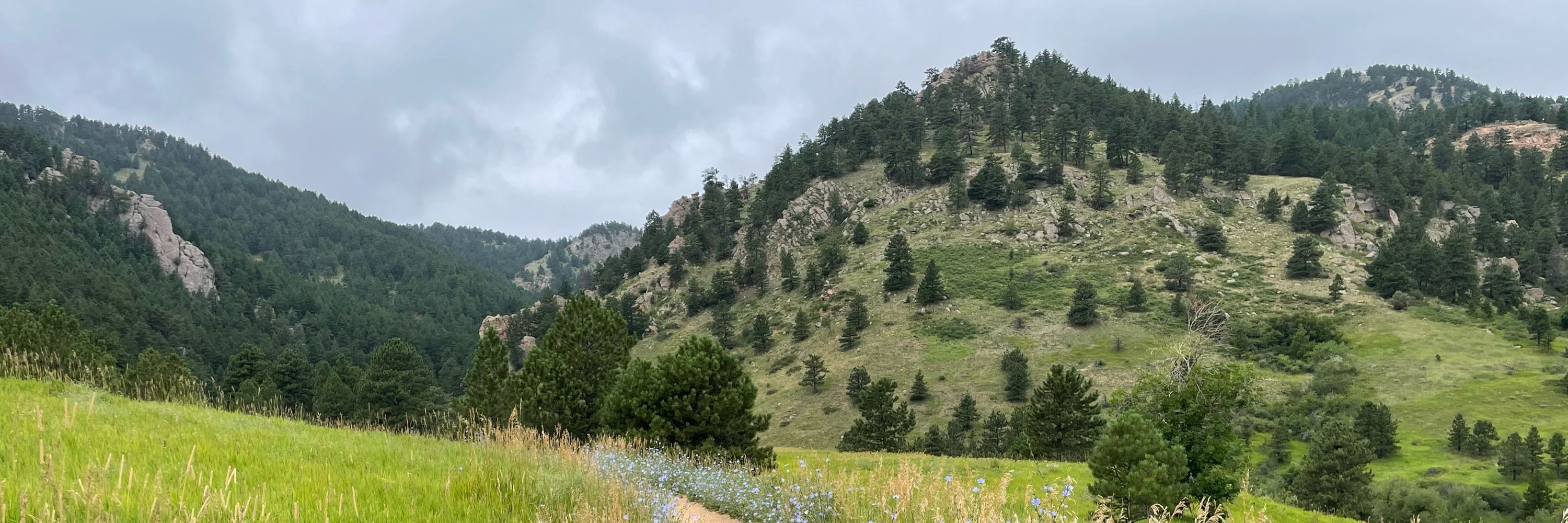
Laura Scherer
@ldscherer.bsky.social
Associate prof in Colorado. Research spans shared decision making, risk communication, health misinformation and science skepticism. Open science advocate
Reposted by Laura Scherer
Letters www.acpjournals.org/doi/10.7326/... re our 2024 paper on Mammography Screening Preferences Among Women in Their 40s www.acpjournals.org/doi/10.7326/...
@ldscherer.bsky.social
Reducing barriers to desired care while respecting patient autonomy to make informed decisions should be dual goals.
@ldscherer.bsky.social
Reducing barriers to desired care while respecting patient autonomy to make informed decisions should be dual goals.
July 15, 2025 at 12:18 AM
Letters www.acpjournals.org/doi/10.7326/... re our 2024 paper on Mammography Screening Preferences Among Women in Their 40s www.acpjournals.org/doi/10.7326/...
@ldscherer.bsky.social
Reducing barriers to desired care while respecting patient autonomy to make informed decisions should be dual goals.
@ldscherer.bsky.social
Reducing barriers to desired care while respecting patient autonomy to make informed decisions should be dual goals.
Reposted by Laura Scherer
📚 A billion-dollar donation: estimating the cost of researchers’ time spent on peer review researchintegrityjournal.biomedcentral.com/articles/10....

A billion-dollar donation: estimating the cost of researchers’ time spent on peer review - Research Integrity and Peer Review
Background The amount and value of researchers’ peer review work is critical for academia and journal publishing. However, this labor is under-recognized, its magnitude is unknown, and alternative way...
researchintegrityjournal.biomedcentral.com
June 18, 2025 at 8:09 AM
📚 A billion-dollar donation: estimating the cost of researchers’ time spent on peer review researchintegrityjournal.biomedcentral.com/articles/10....
Reposted by Laura Scherer
Psychological inoculation is a very popular intervention against online misinfo, but it hasn't been tested using real-world outcomes in realistic scenarios.
In a new paper just published in PNAS Nexus, this is what we did: academic.oup.com/pnasnexus/ar...
Short version: It didn't really work.
In a new paper just published in PNAS Nexus, this is what we did: academic.oup.com/pnasnexus/ar...
Short version: It didn't really work.
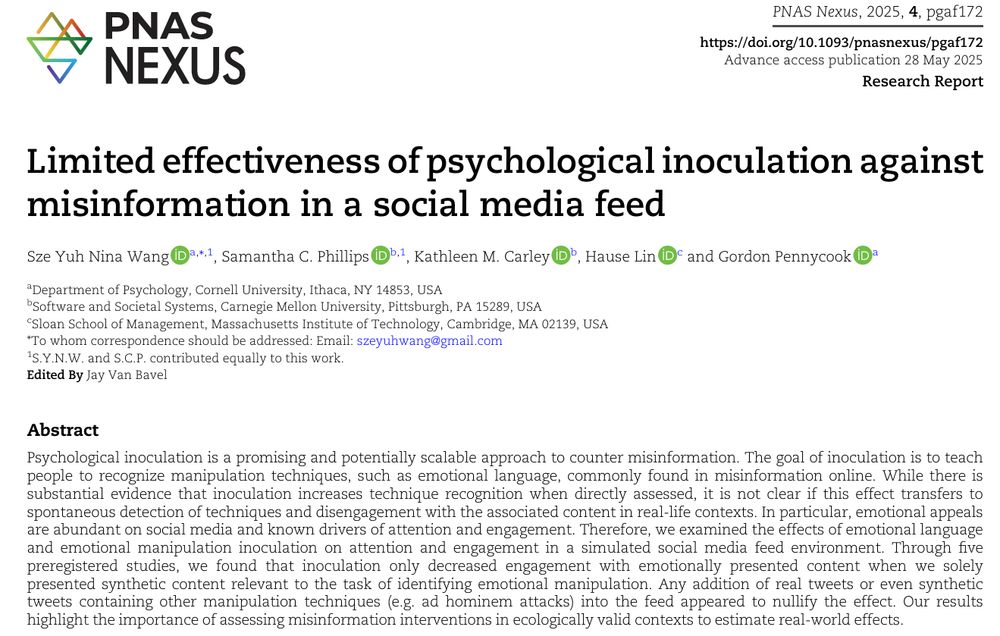
June 5, 2025 at 7:33 PM
Psychological inoculation is a very popular intervention against online misinfo, but it hasn't been tested using real-world outcomes in realistic scenarios.
In a new paper just published in PNAS Nexus, this is what we did: academic.oup.com/pnasnexus/ar...
Short version: It didn't really work.
In a new paper just published in PNAS Nexus, this is what we did: academic.oup.com/pnasnexus/ar...
Short version: It didn't really work.
Reposted by Laura Scherer
I have written many healthcare stories, but never before have I written about my own health. I decided to do so after learning one of my drugs costs nearly $1,000 a pill and just 25 cents to make. What I found was an incredible story of discovery and exploitation. www.propublica.org/article/revl...

The Price of Remission
When I was diagnosed with cancer, I set out to understand why a single pill of Revlimid cost the same as a new iPhone. I’ve covered high drug prices as a reporter for years. What I discovered shocked ...
www.propublica.org
May 8, 2025 at 1:51 PM
I have written many healthcare stories, but never before have I written about my own health. I decided to do so after learning one of my drugs costs nearly $1,000 a pill and just 25 cents to make. What I found was an incredible story of discovery and exploitation. www.propublica.org/article/revl...
In a faculty meeting yesterday I learned that the cost of hospital materials has already gone up due to Trump China tariffs.
May 2, 2025 at 2:58 PM
In a faculty meeting yesterday I learned that the cost of hospital materials has already gone up due to Trump China tariffs.
Reposted by Laura Scherer
Earlier today, AAAS CEO Sudip Parikh testified as a bipartisan witness before the U.S. Senate Appropriations Committee, warning that without immediate action, the U.S. runs the risk of losing its position as a global leader in biomedical research and innovation.
April 30, 2025 at 10:20 PM
Earlier today, AAAS CEO Sudip Parikh testified as a bipartisan witness before the U.S. Senate Appropriations Committee, warning that without immediate action, the U.S. runs the risk of losing its position as a global leader in biomedical research and innovation.
Reposted by Laura Scherer
Francis Collins: “Reckless decisions will disrupt a noble institution with a stunningly positive track record, drive young scientists to leave the country, and damage the future health of the nation." www.science.org/content/arti...

NIH insiders: Trump is ‘dismantling and destroying everything’
After just 100 days, agency scientists say U.S. health institutes are demoralized and have lost essential staff and funding
www.science.org
May 1, 2025 at 2:24 AM
Francis Collins: “Reckless decisions will disrupt a noble institution with a stunningly positive track record, drive young scientists to leave the country, and damage the future health of the nation." www.science.org/content/arti...
Reposted by Laura Scherer
Here's some good news!
The file drawer problem may have diminished in recent years, at least in social science survey experiments
"This suggests increased recognition of the importance of null results."
www.pnas.org/doi/10.1073/...
The file drawer problem may have diminished in recent years, at least in social science survey experiments
"This suggests increased recognition of the importance of null results."
www.pnas.org/doi/10.1073/...
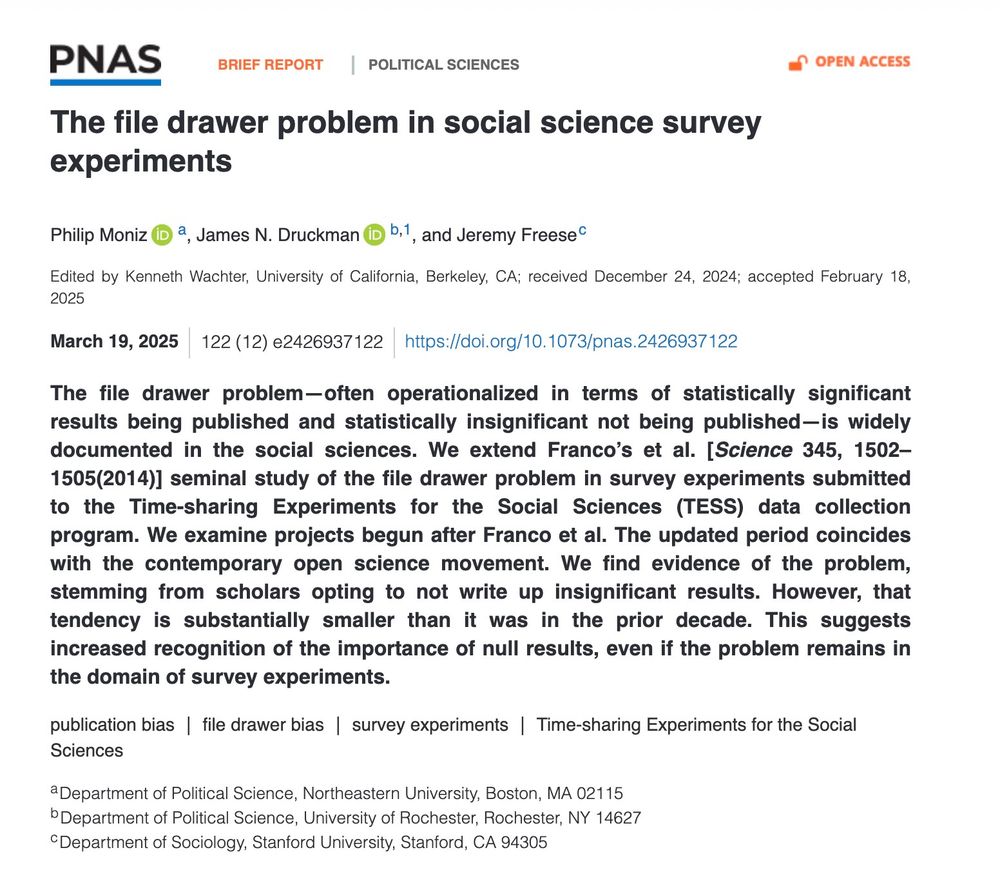
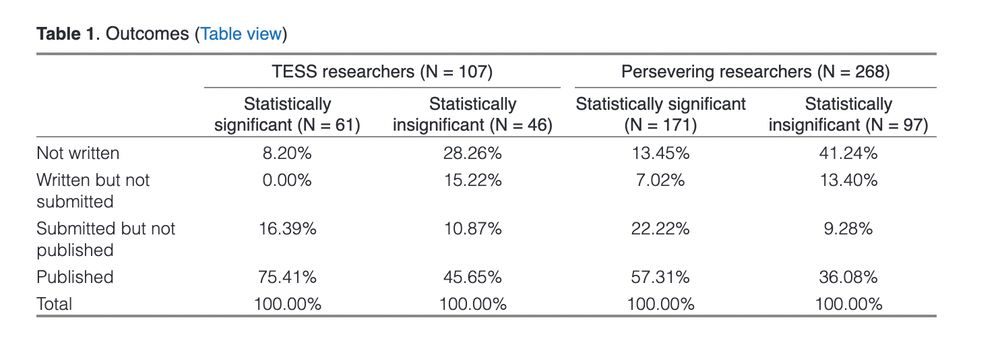
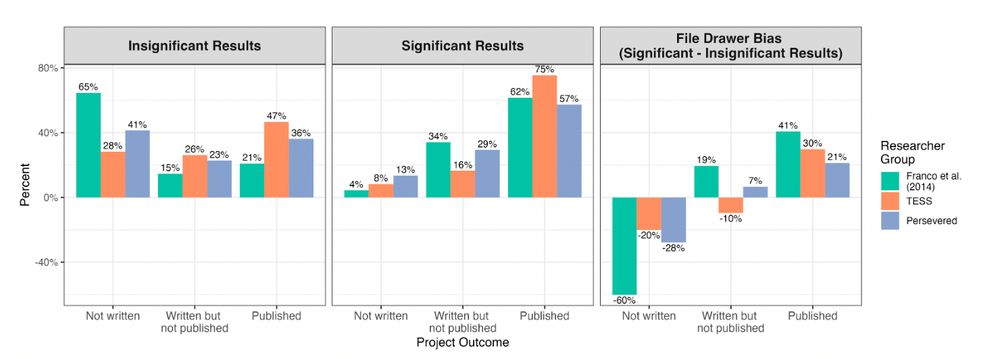
April 27, 2025 at 12:22 AM
Here's some good news!
The file drawer problem may have diminished in recent years, at least in social science survey experiments
"This suggests increased recognition of the importance of null results."
www.pnas.org/doi/10.1073/...
The file drawer problem may have diminished in recent years, at least in social science survey experiments
"This suggests increased recognition of the importance of null results."
www.pnas.org/doi/10.1073/...
This was an educational read on what’s being planned for NIH cuts and our chance to stop it
New at Can We Still Govern: An anonymous NIH employee maps out the GOP budget gameplan to permanently gut our most important science agency.
Impoundment, delay and red tape will create artificial "savings" that become the new benchmark for NIH budgets.
donmoynihan.substack.com/p/the-nih-bu...
Impoundment, delay and red tape will create artificial "savings" that become the new benchmark for NIH budgets.
donmoynihan.substack.com/p/the-nih-bu...
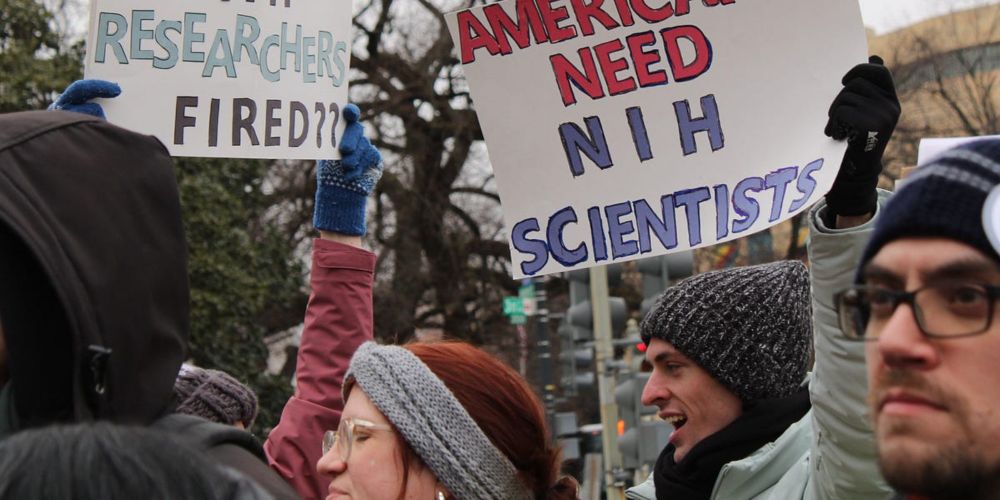
The NIH budget is on a fast track to disaster
An NIH insider explains what Republicans are likely to do next, and what we can do
donmoynihan.substack.com
April 29, 2025 at 3:03 AM
This was an educational read on what’s being planned for NIH cuts and our chance to stop it
Reposted by Laura Scherer
Can confirm that my NSF grant "How False Beliefs Form & How to Correct Them" was cancelled today because it is "not in alignment with current NSF priorities" Shocking that understanding how people are misled by false information is now a forbidden topic. Our work will continue but at a smaller scale
NSF has posted an “update on priorities.”
They’re canceling all “DEI and misinformation/disinformation” grants.
And the guidance on how to fulfill the longstanding, legally mandated Broadening Participation requirement is utterly incoherent.
www.nsf.gov/updates-on-p...
They’re canceling all “DEI and misinformation/disinformation” grants.
And the guidance on how to fulfill the longstanding, legally mandated Broadening Participation requirement is utterly incoherent.
www.nsf.gov/updates-on-p...
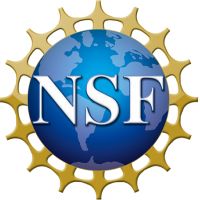
Updates on NSF Priorities
www.nsf.gov
April 18, 2025 at 10:40 PM
Can confirm that my NSF grant "How False Beliefs Form & How to Correct Them" was cancelled today because it is "not in alignment with current NSF priorities" Shocking that understanding how people are misled by false information is now a forbidden topic. Our work will continue but at a smaller scale
This was a super fun conversation about health misinformation and trust in science. We only touched the tip of the iceberg, but give it a listen and tell me what you think!
news.cuanschutz.edu/news-stories...
news.cuanschutz.edu/news-stories...

How Do We ‘Trust the Science’ in an Age of Misinformation?
Health Science Radio episode features experts weighing in on the spread of misinformation about science and possible strategies for addressing the problem.
news.cuanschutz.edu
April 6, 2025 at 4:06 PM
This was a super fun conversation about health misinformation and trust in science. We only touched the tip of the iceberg, but give it a listen and tell me what you think!
news.cuanschutz.edu/news-stories...
news.cuanschutz.edu/news-stories...
I'm personally really sad to see AHRQ go. They had a small but mighty team trying to improve shared decision making in medicine, and now all those people are gone.
kffhealthnews.org/news/article...
kffhealthnews.org/news/article...

What’s Lost: Trump Whacks Tiny Agency That Works To Make the Nation's Health Care Safer - KFF Health News
The Agency for Healthcare Research and Quality has helped improve health care safety in a country where thousands die of medical errors each year. It was effectively dissolved Tuesday.
kffhealthnews.org
April 4, 2025 at 5:25 PM
I'm personally really sad to see AHRQ go. They had a small but mighty team trying to improve shared decision making in medicine, and now all those people are gone.
kffhealthnews.org/news/article...
kffhealthnews.org/news/article...
Our latest study in BMJ Open examined how women react to learning about overdiagnosis in breast cancer screening. We found that preexisting beliefs about cancer made it hard for some women to comprehend and accept overdiagnosis bmjopen.bmj.com/content/15/3/e087997
Evaluation of how US women react to a decision aid informing them of the harms and benefits of mammography: a qualitative study
Objectives To evaluate how women react to a decision aid (DA) informing them of the harms and benefits of mammography, including overdiagnosis.
Background Breast cancer is the most common cancer affe...
bmjopen.bmj.com
April 3, 2025 at 11:53 PM
Our latest study in BMJ Open examined how women react to learning about overdiagnosis in breast cancer screening. We found that preexisting beliefs about cancer made it hard for some women to comprehend and accept overdiagnosis bmjopen.bmj.com/content/15/3/e087997
Reposted by Laura Scherer
Economists are baffled as to why the US is gutting its unmatched scientific enterprise:
“This is really killing the goose that lays the golden egg.”
“It’s (science) like a machine, you put a dollar in and you get $5 back.”
www.nytimes.com/2025/03/31/b...
“This is really killing the goose that lays the golden egg.”
“It’s (science) like a machine, you put a dollar in and you get $5 back.”
www.nytimes.com/2025/03/31/b...

Trump Science Funding Cuts May Hurt Economy, Experts Say
Since World War II, U.S. research funding has led to discoveries that fueled economic gains. Now cutbacks are seen as putting that legacy in jeopardy.
www.nytimes.com
March 31, 2025 at 5:57 PM
Economists are baffled as to why the US is gutting its unmatched scientific enterprise:
“This is really killing the goose that lays the golden egg.”
“It’s (science) like a machine, you put a dollar in and you get $5 back.”
www.nytimes.com/2025/03/31/b...
“This is really killing the goose that lays the golden egg.”
“It’s (science) like a machine, you put a dollar in and you get $5 back.”
www.nytimes.com/2025/03/31/b...
Reposted by Laura Scherer
The first randomized trial comparing fecal occult blood testing (every other year) testing and (one-time) colonoscopy. No significant difference in colon cancer mortality among >56,000 participants
www.thelancet.com/journals/lan... @thelancet.bsky.social
www.thelancet.com/journals/lan... @thelancet.bsky.social

March 29, 2025 at 5:03 PM
The first randomized trial comparing fecal occult blood testing (every other year) testing and (one-time) colonoscopy. No significant difference in colon cancer mortality among >56,000 participants
www.thelancet.com/journals/lan... @thelancet.bsky.social
www.thelancet.com/journals/lan... @thelancet.bsky.social
Reposted by Laura Scherer
Earlier this week, The Regime suddenly axed grants related to LongCOVID. Massive backlash from advocates ensued. And today, the NIH reversed course and reinstated at least some of this grant funding. Keep making noise. Keep taking up space. Keep shouting the truth. thesicktimes.org/2025/03/28/u...

UPDATE: RECOVER Long COVID pathobiology grants restored - The Sick Times
Long COVID research grants from the National Institutes of Health’s RECOVER program will be restored following news stories about their abrupt cancellations and advocacy to restore the funding, accord...
thesicktimes.org
March 28, 2025 at 9:54 PM
Earlier this week, The Regime suddenly axed grants related to LongCOVID. Massive backlash from advocates ensued. And today, the NIH reversed course and reinstated at least some of this grant funding. Keep making noise. Keep taking up space. Keep shouting the truth. thesicktimes.org/2025/03/28/u...
Reposted by Laura Scherer
Across the US, cuts to federal funding for health research are projected to cause losses of $16 billion and 68,500 jobs. How will YOUR county and State be affected? See scienceimpacts.org
SCiMaP
scienceimpacts.org
March 28, 2025 at 4:14 AM
Across the US, cuts to federal funding for health research are projected to cause losses of $16 billion and 68,500 jobs. How will YOUR county and State be affected? See scienceimpacts.org
Reposted by Laura Scherer
This is what breaks my heart. These young people who are so eager and full of promise and who are the next generation of Nobel Prize winners, scientists inventors, teachers. #Trump and #Musk have destroyed it all. www.wired.com/story/the-ch...

The Chaos of NIH Cuts Has Left Early-Career Scientists Scrambling
As graduate programs lose spots and labs face shutdowns following Trump administration cuts to science funding, the path to a science career for students and researchers just got a whole lot harder.
www.wired.com
March 24, 2025 at 11:23 PM
This is what breaks my heart. These young people who are so eager and full of promise and who are the next generation of Nobel Prize winners, scientists inventors, teachers. #Trump and #Musk have destroyed it all. www.wired.com/story/the-ch...
Reposted by Laura Scherer
From 2010 to 2016 (latest data I have ), NIH research contributed to EVERY drug approved by the FDA
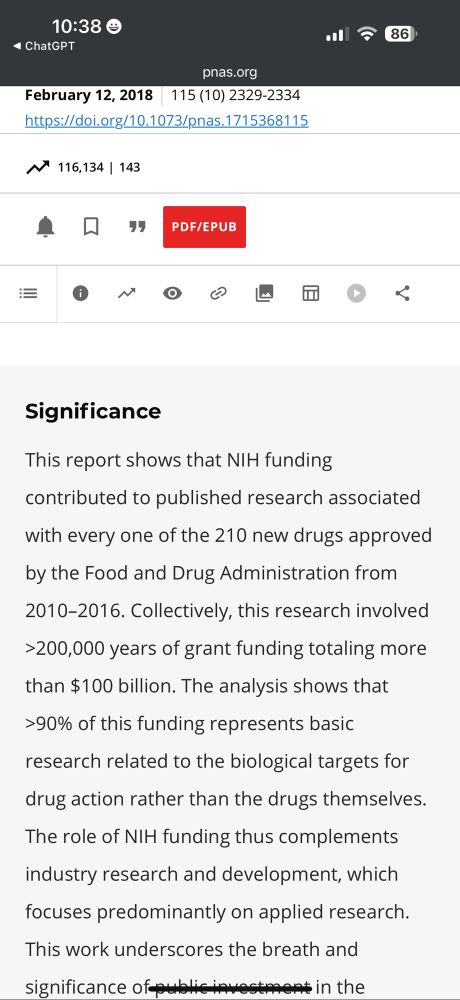
March 22, 2025 at 10:44 AM
From 2010 to 2016 (latest data I have ), NIH research contributed to EVERY drug approved by the FDA
Reposted by Laura Scherer
New paper
Evaluation of how US women react to a decision aid informing them of the harms and benefits of mammography:
a qualitative study
by Brad Morse, @ldscherer.bsky.social, @kirstenmccaffery.bsky.social, me and an illustrious co-author team!
Just out in BMJ Open
bmjopen.bmj.com/content/15/3...
Evaluation of how US women react to a decision aid informing them of the harms and benefits of mammography:
a qualitative study
by Brad Morse, @ldscherer.bsky.social, @kirstenmccaffery.bsky.social, me and an illustrious co-author team!
Just out in BMJ Open
bmjopen.bmj.com/content/15/3...
Evaluation of how US women react to a decision aid informing them of the harms and benefits of mammography: a qualitative study
Objectives To evaluate how women react to a decision aid (DA) informing them of the harms and benefits of mammography, including overdiagnosis. Background Breast cancer is the most common cancer affecting women. In efforts to reduce mortality, mammography has been widely accepted as an effective method of early detection. However, there is a balance between the known harms and benefits of breast cancer screening. Overdiagnosis is the detection of a cancer that would never cause harm over the lifetime. Comprehension and acceptance of overdiagnosis can be difficult for some people. Design Qualitative study using a semistructured interview protocol. Data were analysed in Atlas.Ti and the framework method was used to identify themes. Setting Telephone interviews with participants living in the USA. Participants 30 female individuals aged 39–49, selected from a nationally representative US sample of individuals who had completed a survey <2 weeks prior, during which they viewed a DA describing the main harms and benefits of breast cancer screening. Results Six major themes were identified: (1) overdiagnosis and false positives were often conflated, (2) previous experience and the influence of doctors and family supersedes new information, (3) beliefs about cancer dominate acceptance and comprehension of overdiagnosis, (4) emotional reactions to the novelty of overdiagnosis, (5) reactions to screening benefits—“I’ll be the one”, and (6) people reported the DA is credible, but they remained sceptical and performed their own research. Conclusion This study provides insights into the challenges of communicating about the harms of breast cancer screening, particularly overdiagnosis. While it is critical to honestly communicate with patients about the harms of breast cancer screening, it is also important to consider the emotional impact of conveying such information. Data are available in a public, open access repository. Data are available on the Open Science Framework, [dataset] Scherer L, Suresh K, Mosley B, Frempong J. Data from: R37 Ipsos breast cancer screening survey and qualitative interviews. Open Science Framework, March 4, 2022. <https://osf.io/y8stc/>
bmjopen.bmj.com
March 20, 2025 at 12:02 AM
New paper
Evaluation of how US women react to a decision aid informing them of the harms and benefits of mammography:
a qualitative study
by Brad Morse, @ldscherer.bsky.social, @kirstenmccaffery.bsky.social, me and an illustrious co-author team!
Just out in BMJ Open
bmjopen.bmj.com/content/15/3...
Evaluation of how US women react to a decision aid informing them of the harms and benefits of mammography:
a qualitative study
by Brad Morse, @ldscherer.bsky.social, @kirstenmccaffery.bsky.social, me and an illustrious co-author team!
Just out in BMJ Open
bmjopen.bmj.com/content/15/3...
This, if true, is the exact opposite of efficiency.
ICYMI, NIH will be asking soon for each NIH-funded researcher to justify every draw they make (often several times a week) on their grants and every NIH officer and their boss will have to justify their agreeing on these draws.
This is the death of US biomedical research by a thousand cuts
This is the death of US biomedical research by a thousand cuts
March 17, 2025 at 10:46 PM
This, if true, is the exact opposite of efficiency.
NIH is axing research on mRNA vaccines. But on Jan 22 Trump announced a huge investment with Larry Ellison to develop mRNA cancer vaccines. So mRNA for cancer=good, mRNA for infectious disease=bad. Totally makes sense...
www.science.org/content/arti...
www.foxbusiness.com/markets/trum...
www.science.org/content/arti...
www.foxbusiness.com/markets/trum...

NIH to ax grants on vaccine hesitancy, mRNA vaccines
Move reflects vaccine skepticism of health secretary Robert F. Kennedy Jr.
www.science.org
March 11, 2025 at 8:30 PM
NIH is axing research on mRNA vaccines. But on Jan 22 Trump announced a huge investment with Larry Ellison to develop mRNA cancer vaccines. So mRNA for cancer=good, mRNA for infectious disease=bad. Totally makes sense...
www.science.org/content/arti...
www.foxbusiness.com/markets/trum...
www.science.org/content/arti...
www.foxbusiness.com/markets/trum...
This is an important article. Far more money and resources goes to specialists than primary care. But when you think about your doctor, the medical expert you trust and see the most, they’re probably a primary care doc.
🔗 - www.annfammed.org/content/earl...
This early access article showcases the results of a United States public opinion survey revealing a tremendous disparity between current levels of #PrimaryCare spending & public perceptions of primary care expenditure and value. #FMsky #Medsky
This early access article showcases the results of a United States public opinion survey revealing a tremendous disparity between current levels of #PrimaryCare spending & public perceptions of primary care expenditure and value. #FMsky #Medsky

March 11, 2025 at 2:06 AM
This is an important article. Far more money and resources goes to specialists than primary care. But when you think about your doctor, the medical expert you trust and see the most, they’re probably a primary care doc.
Lol
you’re fired. wait you’re rehired. email us a list of things you’ve done today wait forget it you’re fired again. come back your job was important. you’re fired. or hired. come in to the office. wait the office has no computers go home. we are the department of government efficiency.
March 6, 2025 at 1:39 PM
Lol


